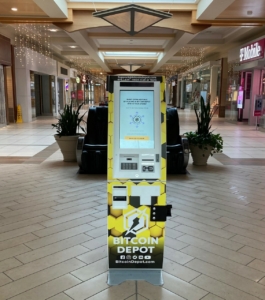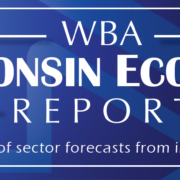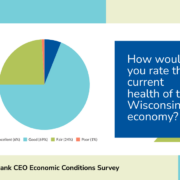Crypto ATMs Pop up Around Wisconsin as Consumer Interest in Digital Currency Grows

By Paul Gores
In a prominent spot near the center of Brookfield Square mall, an automated kiosk quietly invites shoppers to insert cash and buy Bitcoin, Litecoin, or Ethereum cryptocurrencies.
Similar cryptocurrency kiosks — commonly called crypto ATMs or Bitcoin ATMs — can be found in other major Wisconsin malls, as well as in hundreds of convenience stores, gas stations, and retail shops around the state.
At the same time, a cryptocurrency-buying option now is available throughout Wisconsin at many kiosks operated by the self-service coin-cashing company Coinstar — 146 of them in all in the Badger State.
As cryptocurrencies and their enabling technology — blockchain — grow in acceptance and popularity, more and more kiosks that make Bitcoin, Litecoin, and other currencies available to the masses are popping up around the state and nation. There are now more than 35,000 crypto kiosks or ATMs in the U.S. offering people interested in owning the digital currency an easy way to acquire it. In Wisconsin, there are believed to be more than 500 such machines.
The buildup of crypto ATMs — and decentralized currencies operating on blockchain in general — raises questions for American financial institutions whose business traditionally has revolved around a currency with a central authority.
In the short term, bankers shouldn’t worry that cryptocurrencies are about to overtake the dollar to the point where trips to the grocery store routinely will be paid with Bitcoin, one expert said.
“We’re nowhere close to grandpa buying milk with a tiny, tiny, tiny fraction of a Bitcoin,” said computer science professor, Michael Litman, of Concordia University Wisconsin in Mequon.
Still, more companies are accepting payment in cryptocurrency, and nowadays even a wealthy donor might ask whether his or her favored charity will accept a contribution in Bitcoin. Given crypto’s momentum, bankers would be wise to learn as much as they can about cryptocurrency and consider how it could be useful to their customers, experts say.
Cryptocurrencies are here to stay, with a total market value in excess of $2 trillion and more than 200 million users across the globe, said David Krause, director of applied investment management and associate professor of finance at Marquette University in Milwaukee.
Krause said when it comes to cryptocurrency, banks should think of themselves like taxi companies before Uber, or bookstores before Amazon.
“They need to innovate and adopt digital currencies to avoid being run over,” Krause said.
The rise in crypto ATMs coincides with the interest in cryptocurrencies, particularly Bitcoin, which, while volatile, has seen its market price skyrocket over the past few years. Kiosks or ATMs offer average people access to owning Bitcoin or other digital currencies as an investment, or, if they use a vendor that accepts Bitcoin, to easily acquire Bitcoin to make a purchase.
“Coinstar and the Bitcoin kiosk industry generally serve consumers who prefer to budget or manage their funds in cash yet still need access to digital financial products like cryptocurrency,” said Michael Jack, head of product for Coinstar. “There are a variety of use cases. Consumers use cryptocurrencies to invest or save and buy and hold them in a wallet. Others use it as a form of person-to-person or person-to-business transfers. In many cases, cryptocurrency can be an easier and/or more cost-effective way to do those transactions.”
Last fall, Walmart said it had started a pilot program with Coinstar to put crypto-enabled Coinstar kiosks in 200 stores of the nation’s largest retailer. If the pilot is successful and expands to other Walmart stores, the ability to buy cryptocurrency in so many locations could go a long way toward mainstreaming the digital currency.
While some crypto ATMs allow a currency such as Bitcoin to be sold and converted to cash, most transactions at the ATMs involve a customer inserting cash and having an equal amount of Bitcoin at that day’s market price — minus fees — deposited in the buyer’s digital wallet. In the case of Bitcoin, which at the time of writing this was valued at about $48,000, even $1,000 inserted into the ATM would buy only a small fraction.
“There is growing adoption of cryptocurrency, primarily as a speculative investment,” said Scott Green, of Shazam Network-ITS Inc. “While Bitcoin can be used for person-to-person transfers or purchases from retailers that support it, the most prevalent use case is investment.”
However, even though cryptocurrency might not be well-suited for smaller financial transactions yet, it can make sense for larger deals, said Concordia’s Litman. Litman, who has owned and sold Bitcoin, is a fan of some NFTs, or non-fungible tokens, which also are powered by the blockchain.
NFTs are used as a way to validate ownership of something unique, the way, say, a title registered with the Department of Motor Vehicles shows who bought a car. An NFT can do the same thing, except it’s verified by the blockchain for proof of ownership.
“I would actually make the argument that in some ways banks should be embracing this,” Litman said.
Litman also said using NFTs can cut the red tape and expense of international transactions. For instance, $100,000 in U.S. dollars could be converted to an NFT such as Ripple, sent via blockchain to a Ripple digital wallet in China, and then converted into the yuan.
Using a crypto ATM comes at a cost to the user. A commission typically is charged, along with a flat fee. Fees range widely depending on which company operates the ATM.
For example, each cryptocurrency purchase at a Coinstar kiosk carries a transaction fee of 4% and a cash exchange fee of 7%.
Bitcoin Depot, which runs the crypto ATMs at Brookfield Square and other Wisconsin malls, allows for daily purchases of from $20 to $15,000 of cryptocurrency.
Retailers who provide space for cryptocurrency ATMs do so for the reason they host other types of automated kiosks or services — mostly for the rent.
“Adding this service provides an additional revenue stream to the retailer,” said Coinstar’s Jack. “It also brings more consumers into their establishment who are then more likely to spend money in the store.”
Jack said rents vary between providers and retailers, and can encompass either a flat rent and/or a revenue share.
“For Coinstar retailers, it is a service offered on an existing kiosk with no additional space or labor required by the retailer,” he noted.
On its website, Coin ATM Radar puts the number of cryptocurrency kiosks in Wisconsin at 416, although that appears not to include the nearly 150 Coinstar kiosks offering a crypto function.
Among other crypto ATM operators in Wisconsin are Digitalmint, Athena, and CoinFlip.
As of now, crypto ATMs are not regulated by the Wisconsin Department of Financial Institutions. But as locations and usage grows, they could face increasing scrutiny by state and federal regulators.
CNBC reported in November that as the number of crypto ATMs in the U.S. has grown, criminals increasingly have used the machines in schemes including money laundering and drug trafficking.
The CNC report said the ease of transactions and relative anonymity allowed when using them has contributed to abuses of the ATMs, and that some in the industry are pushing for uniform standards to prevent crime amid a patchwork of rules and state laws.
Experts generally believe some kind of regulation is coming for cryptocurrencies.
“I do expect more regulation over time. But regulation focused on cutting off fraud should and hopefully will be first and foremost,” said Joseph Wall, associate professor of accounting at Marquette University.
Litman said some attempt to regulate cryptocurrency is likely, but it might not be easy.
“Yes, the government is going to want to step in and do it. With blockchain, because of the nature of it, it’s going to be very difficult. Who are they going to hold accountable?” he said.
Shazam’s Green said that to some extent, there are regulations and statutes that apply to cryptocurrency, but the enforcement is difficult due to the nature of decentralized finance.
“For example, Bitcoin as a crypto should roughly follow commodities laws, and tokens that look like securities should fall under securities laws,” Green said. “The regulatory environment around the entire crypto, DeFi (decentralized finance), and stable coin industry is in flux, but we are starting to get more clarity by the day. Also, as banks start delving into it more, they will be seeking guidance and approval of regulators for their projects, and that will help clarify ambiguities.”
Should banks become involved in offering customers crypto options or even crypto ATMs?
“It would make a lot of sense to offer a platform like an ATM, but one that can do more,” said Marquette’s Wall, an expert in blockchain and related technologies. “A bank that wants to increase its customer base and service its customers based on their needs should consider multiple ways that their customers may want to store their wealth, conduct transactions, and interact with their mediums of exchange. ATMs are one way to do this. Increasing the ability of a customer to transact, transfer, and use their chosen medium of exchange is the very basis of banking, starting with the barter system. I cannot imagine a bank believing that U.S. dollars only is a permanently sustainable business model.”
Green said there’s not a need for banks to rush into crypto ATMs.
“Banks don’t need to do anything to allow customers to purchase and use cryptocurrency. The debit cards, ACH, and new faster payment gateways will all help facilitate fiat-to-crypto conversions for customers when they’re using any third-party service such as an exchange,” Green said. “A question banks may start asking is what else can we do directly ourselves that provides value and earns revenue? For example, rather than ATMs, the digital banking platforms that banks have provide a much more flexible, efficient, and convenient interface to buy and sell crypto.”
Marquette’s Krause doesn’t particularly like the idea of banks adding crypto ATMs.
“Bitcoin and crypto ATMs can be convenient for investors and consumers, but I am not a fan,” Krause said. “They tend to have high transaction fees, they are not widely available, and like most ATMs, they often have technical problems. I think bankers have a lot more to worry about than crypto ATMs!”
Regardless of how much crypto ATMs proliferate, banks should be paying attention to cryptocurrencies, experts said.
Wall said decentralized financial models are one of the greatest threats to traditional banking in a long time.
“I have seen studies that suggest it can cost more for a poor person to send money to and from other relatives in other economically impoverished areas than it did 30 years ago,” Wall said. “This should not be. Cryptocurrencies can be an equalizer by slashing rates and making costs proportional for all. The speed, execution, immutability, and cost structure are such that it is understandable why the market capitalization of DeFi companies is already rivaling that of traditional banks.”
There are ways for banks to work with cryptocurrencies, and they need to look into them, Wall said.
“Some banks will likely create their own cryptocurrencies, embrace the use of a Fedcoin should one be created, or partner with traditional cryptocurrencies to hedge their risks in the space,” Wall said. “Those banks which do so will likely experience a reduction of profitability in percentage terms, but an increase in the number of transactions such that overall profitability may increase, depending on their creativity.”
Wall said banks that ignore the sector are likely establishing a profitability maximum this year.
“They will likely still be able to grow for a while, but the gap between their rate of growth and the potential growth they could have — by embracing cryptocurrencies — will begin to widen at an increasing rate,” Wall said. “It is not that banks are going away. The business models they employ are rapidly changing. Those that adapt can still do well. Those that do not will struggle.”
Gores is a journalist who covered business news for the Milwaukee Journal Sentinel for 20 years.
SHAZAM® is a WBA Gold Associate Member.








